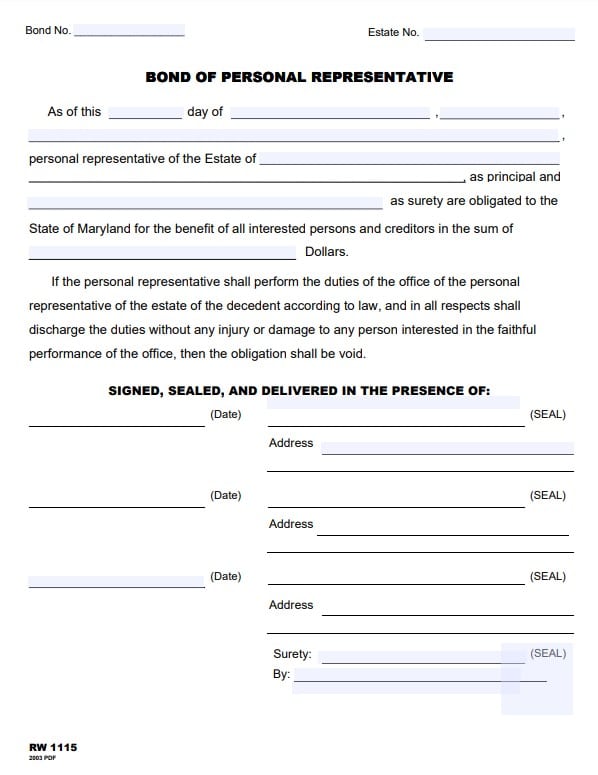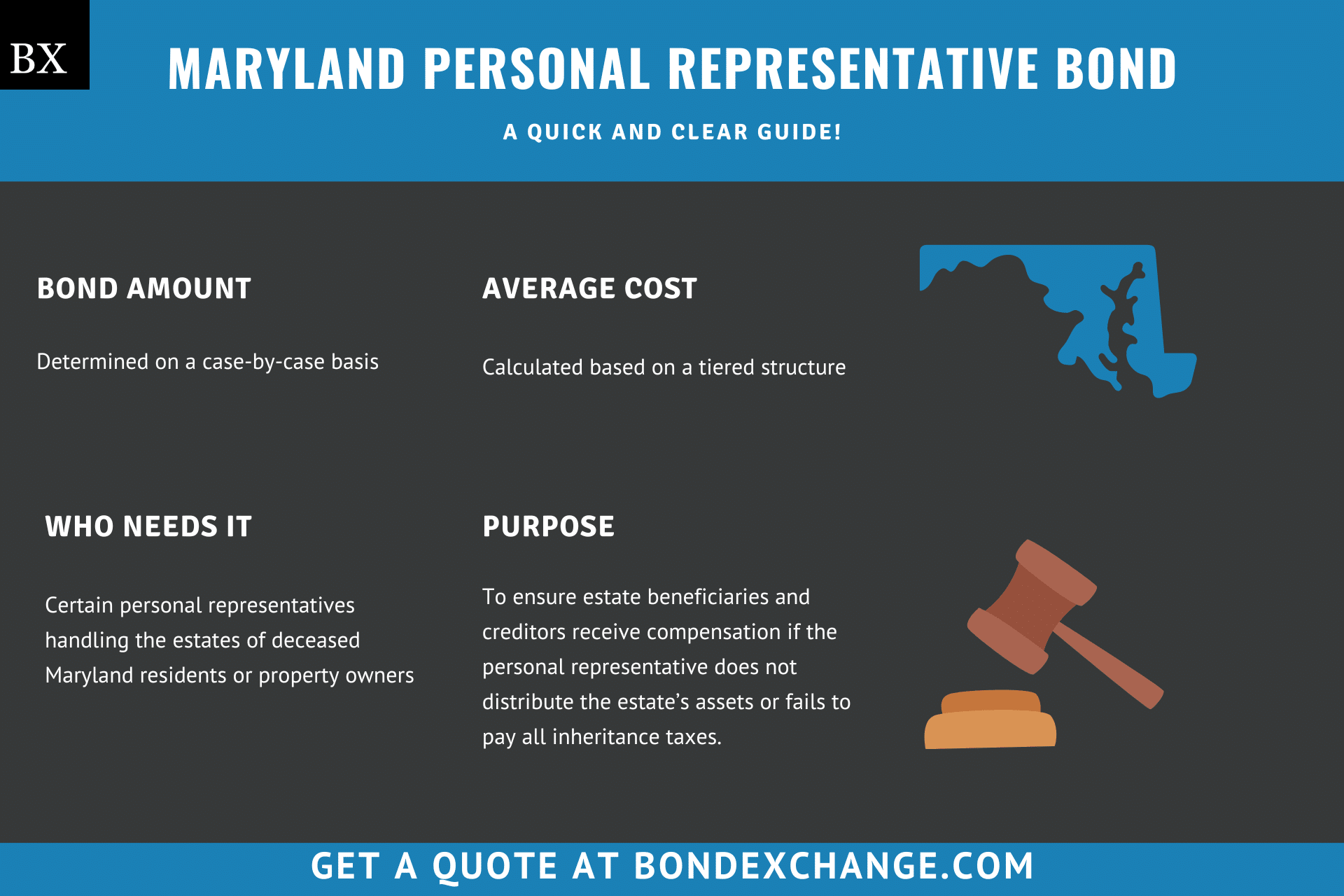Maryland Personal Representative Bond: A Comprehensive Guide
This guide provides information for insurance agents to help their customers obtain a Maryland Personal Representative bond.
At a Glance:
- Average Cost: Calculated based on a tiered structure
- Bond Amount: Determined on a case-by-case basis (more on this later)
- Who Needs it: Certain personal representatives handling the estates of deceased Maryland residents or property owners
- Purpose: To ensure estate beneficiaries and creditors receive compensation if the personal representative mishandles the estate’s assets
- Who Regulates Personal Representatives in Maryland: The orphan’s court of the county where the deceased individual resided or had property

Background
Maryland Statute 5-102 requires all personal representatives of an estate to be appointed by a court before assuming their fiduciary duties. The Maryland legislature enacted the appointment requirement to ensure that personal representatives do not mismanage the estate’s assets. To provide financial security for the enforcement of this requirement, the court may require the personal representative to purchase a probate surety bond to be eligible for appointment.
What is the Purpose of the Maryland Personal Representative Bond?
Maryland requires personal representatives to purchase a surety bond as a prerequisite to being appointed as a fiduciary over an estate’s assets. The bond ensures that the estate’s beneficiaries and creditors will receive compensation for financial harm if the personal representative fails to abide by the regulations outlined in Maryland Statute 6-102. Specifically, the bond protects beneficiaries and creditors if the personal representative fails to properly distribute the estate’s assets or pay all required inheritance taxes. In short, the bond is a type of insurance that protects the estate’s beneficiaries and creditors if the personal representative violates their fiduciary duties.
How Can an Insurance Agent Obtain a Maryland Personal Representative Surety Bond?
BondExchange makes obtaining a Maryland Personal Representative bond easy. Simply login to your account and use our keyword search to find the “Probate” bond in our database. Don’t have a login? Gain access now and let us help you satisfy your customers’ needs. Our friendly underwriting staff is available by phone (800) 438-1162, email or chat from 7:30 AM to 7:00 PM EST to assist you.
At BondExchange, our 40 years of experience, leading technology, and access to markets ensures that we have the knowledge and resources to provide your clients with fast and friendly service whether obtaining quotes or issuing bonds.
Not an agent? Then let us pair you with one!

Click the above image to find a BX Agent near you
How is the Bond Amount Determined?
Maryland Statute 6-102 grants the court the authority to determine the required bond amount on a case-by-case basis. However, the statute also dictates that the bond amount may not exceed the probable maximum value of the estate’s personal property during the administration period minus:
- The amount of collateral the personal representative posts with the court
- The value of property deposited with a banking institution that cannot be withdrawn without court approval
The court may increase or reduce the required bond amount at any time for good cause.
What are the Underwriting Requirements for the Maryland Personal Representative Bond?
Most surety companies will examine the following factors when determining eligibility for the Maryland Personal Representative bond:
- Personal representative’s credit history (not considered for bonds with limits less than $25,000)
- Whether or not the estate has an attorney (not considered for bonds with limits less than $25,000)
- How long the fiduciary appointment is for
- Whether or not the personal representative is replacing a prior fiduciary
- If the personal representative has ever committed a felony
- If there are disputes among the estate’s beneficiaries
- Whether or not there is any ongoing business in the estate
- If the bond is being required by a creditor
How Much Does the Maryland Personal Representative Bond Cost?
Surety companies typically determine the premium rate for personal representative bonds based on a tiered structure. As a result, larger bond amounts will be charged a lower premium rate than smaller bonds.
The following table illustrates the pricing structure for the Maryland Personal Representative bond:
$1,500,000 Personal Representative Bond Cost
| Bond Amount | Premium Rate | Total Bond Cost |
|---|---|---|
| First $20,000 | 0.75% | $150 |
| Next $40,000 | 0.60% | $240 |
| Next $140,000 | 0.50% | $700 |
| Next $300,000 | 0.375% | $1,125 |
| Next $1,000,000 | 0.25% | $2,500 |
| Total cost of $4,715 |
Who is Required to Purchase the Maryland Personal Representative Bond?
Maryland requires personal representatives to purchase a surety bond as a prerequisite to obtaining a fiduciary appointment. To paraphrase Maryland Statute 1-101, a personal representative is a court-appointed fiduciary responsible for administering a deceased individual’s estate. Personal representatives are referred to as executors if the deceased individual nominated them in their will (testate), and administrators if they were not nominated if no will exists (intestate).
Personal representatives are not required to purchase a bond if:
- The will explicitly waives the bond requirement
- All persons with an interest in the estate agree to waive the bond requirement
- They are a national banking association or trust company
Any interested person may petition the court to require a bond of an exempt personal representative. Additionally, even if the personal representative is exempt, a bond must still be posted with the court in an amount that is sufficient to cover the estate’s debts and owed inheritance taxes.

How do Personal Representatives Become Appointed in Maryland?
Personal representatives in Maryland must navigate several steps to become court-appointed fiduciaries. Below are the general guidelines, but applicants should refer to Maryland’s probate code and the state’s Administration of Estate’s Booklet for details on the process.
Step 1 – Meet the Qualifications
Personal representatives are ineligible for appointment if they:
-
- Are under 18 years old
- Are mentally incompetent
- Have been convicted of a serious crime (fraud, extortion, embezzlement, etc.), unless they show good cause for appointment
- Are a non-citizen, unless they are a permanent resident and are the deceased individual’s
- Spouse
- Ancestor
- Descendent
- Sibling
- Are a full-time judge, clerk of court, or register in Maryland, unless they are related to the deceased individual’s surviving spouse or related to them in the third degree
- A non-resident, unless a resident of the state is appointed to receive service of process
Step 2 – Determine Priority
Priority to for appointment as a personal representative is granted in the following order:
-
- Executors named in the will or the persons they nominate (if nominating power is granted in the will)
- The surviving spouse of a testate estate or the surviving spouse and children of an intestate estate
- Residuary legatees (persons named to receive all of the estate’s personal property that was not specifically assigned under the will)
- Children of a testate estate that are entitled to the estate’s property
- Grandchildren entitled to a share of the estate
- Parents entitled to a share of the estate
- Siblings entitled to a share of the estate
- Any other relative
- The deceased individual’s largest creditor that applies for an appointment
- Persons with a pecuniary interest (reasonable assumption of receiving property) in the estate
- Any other qualified person
Step 3 – Hire an Attorney
Although not explicitly required, it is highly recommended that personal representatives hire an attorney to assist with the probate process.
Step 4 – Determine the Estate Administration Type
Maryland has three distinct estate administration types, as outlined below:
-
- Regular Estate: Standard process in which the personal representative administers the estate at the direction of the court. Regular estate administration can consist of administrative probate where the personal representative is under minimal court supervision or judicial probate which consists of litigation to determine the validity of a will and the administration of the estate.
- Modified Administration: The personal representative is under minimal court supervision and does not have to file an inventory of the estate’s assets or accountings of their actions. Modified administration is available if the estate is solvent, has the assets to satisfy all testamentary gifts (gifts made through the will), and the residual takers are limited to:
- The personal representative
- Persons or trusts exempt from inheritance tax
- Small Estate: A simplified administration process available to estates worth no more than $50,000 or $100,000 if the surviving spouse is the sole heir
Step 5 – Contact the Register of Wills
Personal representatives must contact the Register of Wills of the county with jurisdiction over the deceased individual’s estate. The Register of Wills will walk the personal representative through the appointment process, provide them with all required forms, and answer any questions they may have.
Step 6 – Purchase a Surety Bond
Unless otherwise exempt, personal representatives must purchase and maintain a surety bond (limits outlined above).
How do Maryland Personal Representatives File Their Bonds?
Personal representatives should submit their completed bond forms, including the power of attorney, to the Register of Wills with jurisdiction over the estate.
The surety bond requires signatures from the company that issues the bond and the personal representative. The surety company should include the following information on the bond form:
- Date the bond goes into effect
- Name of the deceased individual
- Legal name and address of the entity/individual(s) buying the bond
- Surety company’s name and address
- Bond amount
- Date the bond is signed
What can Maryland Personal Representatives do to Avoid Claims Made Against Their Bonds?
To avoid claims against their bonds, personal representatives in Maryland must ensure that they:
- Properly distribute the estate’s assets
- Pay all required inheritance taxes
- Fulfill their fiduciary duties
